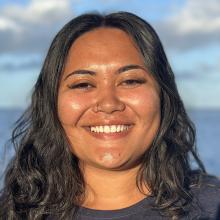
Eva Patai
Tell us about your work/research. What kinds of things do you do?
I work in the Environmental Compliance Division of the National Environment Service, where I help protect and manage the natural environment of the Cook Islands. My role involves overseeing compliance with the Environment Act 2003, which includes assessing and issuing permits for developments and projects, monitoring activities to ensure they meet environmental standards, and investigating any breaches that may cause harm to our environment. I also work closely with communities, government agencies, and stakeholders to provide guidance on best practices and to strengthen environmental protection across the Pa Enua and Rarotonga.
What sparked your initial interest in your career?
Growing up in the Cook Islands, I have been surrounded by the ocean my entire life. Its vital role in human survival and its vast, unexplored nature have always intrigued me. For Cook Islanders, and Pacific Islanders more broadly, the ocean is central to our identity — it sustains us, shapes our culture, and carries our legacy. This deep connection to the environment has been a driving force behind my decision to pursue a career in this field, where I can contribute to protecting and preserving the natural resources that define who we are.
Who influenced you or encouraged you the most?
My mother played a significant role in shaping my interest in the environmental sector. From an early age, I observed her commitment as she traveled to attend environmental meetings, and I greatly admired her dedication. Her influence encouraged me to pursue my studies and establish my own career in this field.
What element of your work/study do you think is the most fascinating?
At this moment in time, I believe the most fascinating experiences are still ahead. Being part of this expedition might just be one of them. I’ll have the rare opportunity to witness life on the seabed—things most people never get to see—alongside the beauty of the surface world, from whales to sea turtles.
How did you get involved with the Ocean Exploration Trust?
As a member of the Marine Unit within my organization, this expedition is a valuable opportunity—not only to build capacity, but to be directly involved in the work I engage with. It offers hands-on experience and a deeper connection to the field I’m passionate about.
What other jobs led you to your current career?
Through my studies—especially in Toi Ohomai’s Marine Environmental Management programme—I have been well equipped for this space. I’ve gone through topics such as marine ecology and monitoring, environmental reporting, freshwater ecology, biosecurity, and risk management. This education not only provides the theoretical foundation, but also real‐world experience through field work, surveying, sampling, data management, and working with regulatory frameworks. It’s been a great way to prepare me for both this expedition and the hands‑on work I will be directly involved in
What are your degrees and certifications?
Level 5 and 6 Diploma in Marine Environmental Management Certification —Toi-ohomai Polytechnic Institute of Technology 2020-2021
DiveMasters Certification —Toi-ohomai Polytechnic Institute of Technology 2020-2021
Bachelor of Science—University of Waikato 2023
What are your hobbies?
I love to paddle (oe vaka), go snorkelling or diving, go to the beach and watch the sunset, read and watch movies, and I also love spending quality time with my family and friends.
What advice would you give someone who wants to have a career like yours?
If you're a Pacific Islander dreaming of working in marine biology, know that it's not just about studying marine animals. Broaden your skill set—explore areas like genetics, data science, or environmental policy—and think about how these can be applied to the marine spaces you care about. Take time to really understand the ecosystems you come from, and listen deeply to the knowledge held by your communities and elders. Respect the paths that have been laid before you, but don’t be afraid to imagine new ones. Stay open, stay curious, and use your creativity to make sense of the ocean world around you. The more you understand who you are and where you come from, the stronger your contribution will be. You belong in this space—and you could be part of the next wave of Pacific-led marine science and exploration. This is your home, your ocean, and your duty.
What excites me the most is knowing that the information we gather on this expedition could potentially be monumental in the future of my country.
Expeditions
Eva participated in the following Ocean Exploration Trust expeditions:
